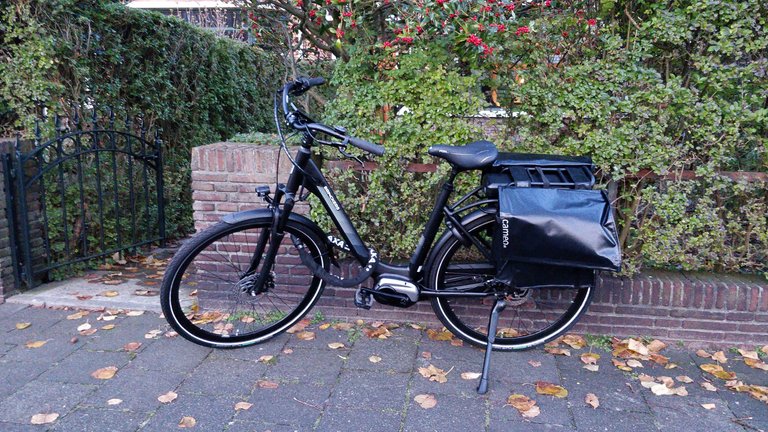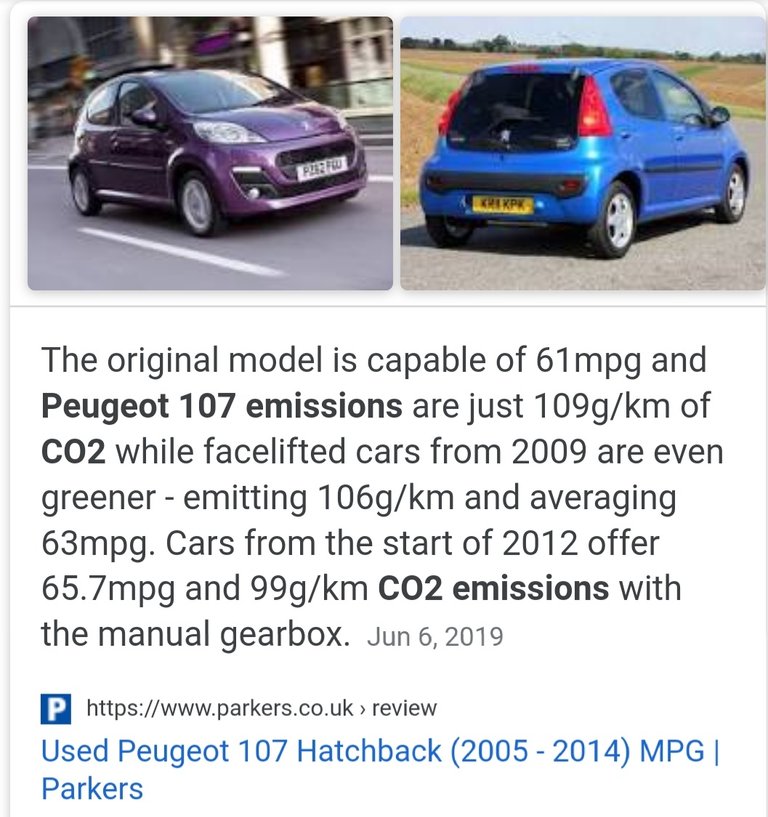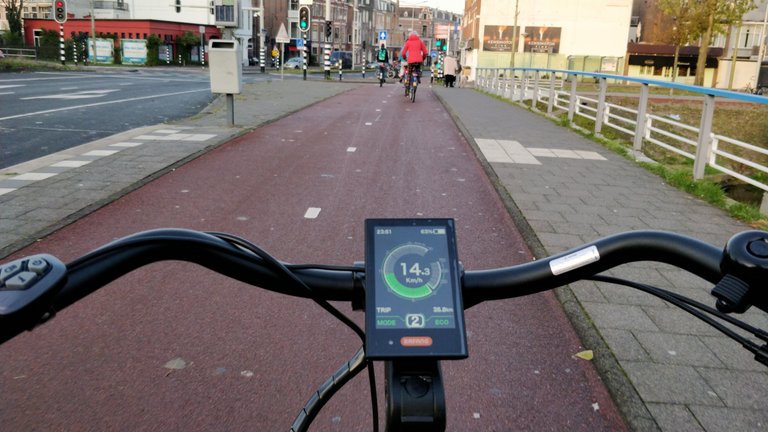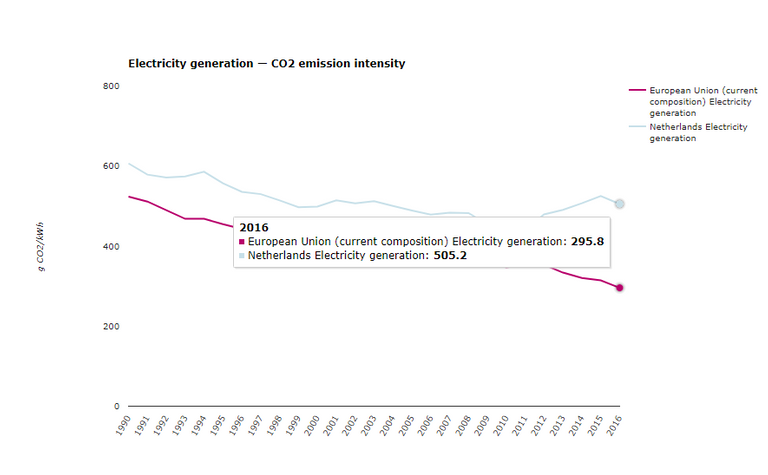Carbon emission comparison (Electric Bike vs Peugeot 107): Is an electric bike worth it?

Okay, let's get this out of the way fast... the outcome of this is going to be pretty obvious, it is pretty damn clear that a bike or an electric bike is just going to be cheaper to run in terms of cost and Carbon emissions compared to even the smallest of small cars. Obviously, there will be situations when one is much more useful than the other... after all, I can't imagine going to do a huge food shop or an IKEA run on a bike.... or even just picking up several kids.... unless you have a cargo bike.
However, this isn't the point of this post... I already knew that the outcome on a relative scale... I just wanted to calculate exactly how big the difference was. Now, this post only takes into account the costs of running the two seperate vehicles and not the upfront costs and maintenance... however, to be honest, seeing as we have a pretty small old car and a fancy new bike... the upfront costs are pretty damn similar and the upkeep costs (repair, maintenance and road taxes) are definitely in the favour of the bike!

Rough Carbon Comparison
For this comparison, I will be using a trip that my wife does quite regularly (three times in the week) that we had originally used as the reason for purchasing the electric bike. She wanted to cycle, but the distance was just a touch on the far side to comfortably do on a regular non-assisted bike. She would arrive tired and exhausted, but with the electric assist, it is no problem. It is a one way trip of around 20 kilometres (if you are American... it is probably about 3254.244315684 inches... or whatever sort of funny ancient measure you use... 2343298.76895037 horse steps or 2347632846.27336 snail-hours).
Car

We have a cute little Peugeot 107... better known as a shopping trolley with an engine. It is more than big enough for our uses (although, our family might start to outgrow it...) and in an urban environment it is more than enough for our short trips... and even the occasional trip to neighbouring European countries.
So, it is quite easy to get information about the carbon output of a car... of course, these are in best condition scenarios with the engine warm and running smoothly... but that's okay, we will take the BEST estimate for the car (it will need the help...). Let us give it around 100 grams of Carbon Dioxide per kilometre.
This gives us around 2000 grams of CO2 for our test trip.
Bike

Our Brickers Brisbane e-bike comes with a 600 Whr (or 0.6 kWhr) battery... it was the middle size of battery that it could take... and is rated for around 80-110 kilometres depending on how you drain it. Of course, that capacity drains over time... if it is anything like my laptop, then it is about 70% capacity after a couple of years (that said, I use more charge cycles on my laptop than the bike).
The bike has a top assist speed of up to 25 kph... however, you can easily push it to 28-30 km with a bit of extra muscle oomph! This does leave it a bit slower than a car... but it just means we allocate a bit more time to travel... sometimes... we don't get stuck in traffic jams!

Unfortunately, The Netherlands has one of the HIGHEST Carbon Dioxide intensities for power generation in Europe... at around 505 grams per kWhr in 2016 (America is on a similar order). Well... that is poop... we are on a more specific "green" energy plan, so our personal calculation would be more rosy for the bike... but in the interests of fair play, we will take the worse country-wide figure.
A single one way trip (the test run!) for the bike drains between 20-25 percent of the battery, so lets say 25%. This would make 150 Whrs, or 0.15 kWhr. Multiplying by the Carbon Dioxide intensity for Dutch power production gives us: 0.15 * 505 = 75 grams.
Comparison
I did this calculation several weeks ago... and since then, I've done it many more times.. well, just because it was SOOOO different! Car at 2000 grams and the bike at 75 grams for the SAME 20 km trip. This is even with figures weighted in favour of the car calculation and making assumptions (perfect running conditions, no emissions whilst stopped...) that were also heavily favourable to the car. I kept thinking that I had made a serious mistake... I was expecting a difference but not that much!
Even if you only burnt coal as a your primary electricity source (roughly 1700 grams per kWhr, rough worst case) for your bike.... you would have 255 grams emission!
There is no comparison to made here. In our particular use case (single person trips with up to three bags of cargo and less than 50 kilometres in radius), the bike is hands down the winner in carbon emission running costs... also in electricity costs vs petrol costs!

Conclusion
So, is an electric bike worth the initial outlay of capital? Well, I guess that depends how much you price your currently externalised environmental costs of your pollution from travelling!
If you consider that your pollution emission should be priced at zero, as it has NO immediate and direct personal cost to you... well, then having an electric bike in addition to a car is probably not a good idea... (unless you count the health costs of driving everywhere rather than doing some additional physical exercise!).
However, if you consider that your pollution emission costs are non-zero and are currently not correctly priced in the economy... then it makes sense to reduce as much as possible your own contribution, both in a future preservation way and also in a reduced future expense sort of way. In that case, having an electric bike as an alternative to the car for single person and relatively short radius trips (in our case, up to 30 kilometres or even 45 kilometres is possible) is a viable solution.... and one that is perhaps better than using public transport and definitely better than a second car!
Of course, this is a multi-faceted problem... this isn't the internet with a single cause and single solution! There is the problem of public transport infrastructure already existing, additional impact due to the construction of an electric bike and associated components (most problematic being the battery, however that is quite interestingly addressed in this Neurologica article). It also depends on your own personal use case and geographic location, maybe an electric bike isn't the right fit... but for most urban areas (and some light non-urban) it really works well (wind and inclines are NO problem at all!).


Account banner by jimramones


This post has received a 3.13 % upvote from @drotto thanks to: @sbi-booster.
Given the amount of CO2 released by bushfires caused by environmental regulations preventing controlled burn-offs, this analysis is pretty moot.
But its interesting nonetheless.
I think the better question is how much money you can save by getting rid of your car and using an electric bike instead combined with a car share for things a car is really necessary for.
I'm not sure that the controlled burn off is being limited by environmental regulations. I think that the fire services themselves have already come out to correct this unfortunate misperception.
Definitely a car share would be a much better solution in the future for us, however at the moment with two young kids we have need of a car more often than is viable with a car share (we've looked into it already!). However, as they get older it becomes a better solution!
We are SO proud to have you as a member of our
FANTABULOUS Power House Creatives family!
upvoted and resteemed!
❤ MWAH!!! ❤
#powerhousecreatives
JOIN US HERE
FOLLOW US ON TWITTER
Posted using Partiko Android
You have been curated on behalf of Inner Blocks: a community encouraging first hand content, with each individual living their best life, and being responsible for their own well being. #innerblocks Check it out at @innerblocks for the latest information and community updates, or to show your support via delegation.
Proof of #posh
https://twitter.com/CryptoBengy/status/1215673792862871554?s=19
Congratulations @bengy! You have completed the following achievement on the Steem blockchain and have been rewarded with new badge(s) :
You can view your badges on your Steem Board and compare to others on the Steem Ranking
If you no longer want to receive notifications, reply to this comment with the word
STOPTo support your work, I also upvoted your post!
Vote for @Steemitboard as a witness to get one more award and increased upvotes!
Interesting comparisons. As a Dutch person raised in Australia and living in Thailand, I have to smile though. The Netherlands is TINY and SO FLAT and that makes all the cycling culture work. Unfortunately not an option here in mountainous Northern Thailand or huge Australia, where 60km plus (each way!) is a normal daily commute in outer urban Melbourne. I would smile to see how effective the cycling is in Thailand where 35C is a cool day. Batteries also die very, very quickly here in extreme heat. But I'm glad you have the option and explain it so well. :)
One of the really HUGE developments the world desperately needs is better battery technology.
Leading the curation trail for both @ecotrain & @eco-alex.
Together We’re Making This World A Better Place.
Click Here To Join the manually curated trail "@artemislives" to support quality eco-green content.
Yeah... every area will need to find it's own solution... the electric bike works really well in an urbanised and compact country like Netherlands (and most of Europe... and even most world-wide cities...) but other places will have to find something...
Solid State batteries...
Interesting analysis. My preferred mode of transport for myself is my pedal bike whenever I can; the primary issue I personally face is that of needing to transport children and that, with the exception of a grocery store, nothing else is nearby.
In far and wide US, where owning a car isn't viewed so much as a nicety as is it a necessity and a god-given-right-and-commandment, biking for every day use is highly difficult; many people have work commutes of 20+ miles. I do think in a highly compressed, urban society that bikes (and electric bikes) would work well, in wider areas it might be difficult.
!BEER
Here, we have seats on the front and back of the bike (normal, not electric ones...) for the kiddie transport... it works well until they are around 5... even then, it's a pretty big extra weight to lug....
In the larger countries, this isn't really a great solution... it is trading time for footprint/moneysavings.... Still, I would like to see how far this bike can go... it is rated for 80-120kms on this battery... so, I should be able to go a fair bit further!
View or trade
BEER.Hey @bengy, here is a little bit of
BEERfrom @wwwiebe for you. Enjoy it!Learn how to earn FREE BEER each day by staking.
Congrats! on your upvotes from the IBT Community
A motor vehicle is the only mode of transport to use where we live, (you still need eyes open for hijacking all the time), would never dream of cycling to work and back.
C02 released into the atmosphere in both cases may be minimal, I would still go for ease of comfort moving young children around in a proper car.
Car pool sharing is popular rather than people traveling alone, reducing C02 foot print.
Yes... for areas like yours, I think the bike is not really that appropriate! Car pooling is a good alternative, after all there is no point having empty seats if you don't need to... plus, it reduces on traffic in the cities!
I took people to work all the years I worked in town, car pooling made sense. Government and Insurance thought they would get clever trying to implement new law saying you now a taxi service and required insurance cover etc., no one adhered any which way to make money!